For you folks who are going to Lui, contact one of the past travelers about the realities of the “latrine” and the bath space. You can adjust to it, but it will be an adjustment.
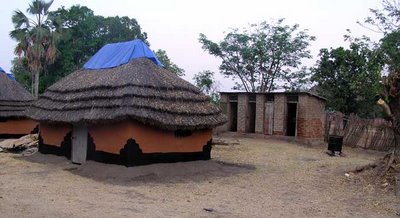 Archdeacon Robert was assigned to the "VIP tukel." It's much larger than any of the other tukels. That's the good news. On the other hand, as you can see here, it's also the tukel closest to the latrines and bathing rooms.
Archdeacon Robert was assigned to the "VIP tukel." It's much larger than any of the other tukels. That's the good news. On the other hand, as you can see here, it's also the tukel closest to the latrines and bathing rooms.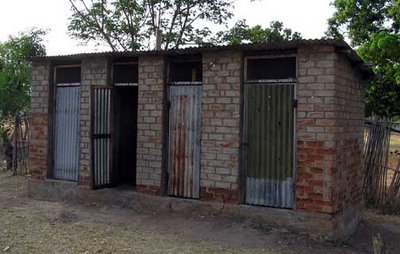
These are the "toiletry facilities."
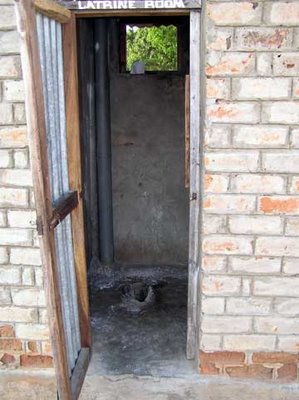 This is the latrine. You need to be able to hold a squatting position for as long as is necessary. And, as discussed elsewhere here, you need to have a high tolerance for odors and insects, reptiles, and mammals.
This is the latrine. You need to be able to hold a squatting position for as long as is necessary. And, as discussed elsewhere here, you need to have a high tolerance for odors and insects, reptiles, and mammals. This is the "bath stall." I never wore sandals before my trip to Lui. But you will be much more comfortable in the "bath" if you take cheap "flip-flops" with you. They need to be the easy-in/easy-off variety. Trust me on this!
This is the "bath stall." I never wore sandals before my trip to Lui. But you will be much more comfortable in the "bath" if you take cheap "flip-flops" with you. They need to be the easy-in/easy-off variety. Trust me on this!Future travelers: Do this exercise before you go to Lui: Pour 1 gallon (or, preferably, less) of bath/shower-temperature water into a basin. And stand in your tub and take a complete bath using only that amount of water. That’s roughly the amount of water you’ll be getting in Lui. To us, sitting in the comfort of our Missouri homes, that feels like “deprivation.” But – trust me! – when you get to Lui, it will feel like waste and greed.
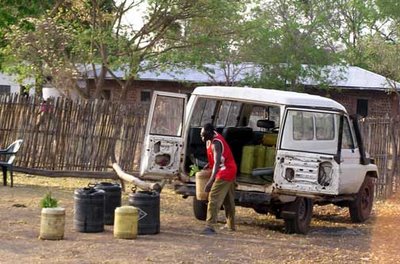 You will see that John or one of our other friends in the compound has to carry every ounce of water you use -- on his head or on his bicycle or maybe (if they are running) in one of the local vehicles. And you will wind up feeling profligate for using even 1 gallon of water for your bath. If your experience is at all like mine, you will abandon the American “more is better” ethos for a Lui “less is much better” one. (My personal best? On our last day, when water was becoming miserably short, I took a “bath” in 3 liters of water. And proud of it!)
You will see that John or one of our other friends in the compound has to carry every ounce of water you use -- on his head or on his bicycle or maybe (if they are running) in one of the local vehicles. And you will wind up feeling profligate for using even 1 gallon of water for your bath. If your experience is at all like mine, you will abandon the American “more is better” ethos for a Lui “less is much better” one. (My personal best? On our last day, when water was becoming miserably short, I took a “bath” in 3 liters of water. And proud of it!)Also, take a low-sudsing bath soap to Lui. I found Dr. Brawner’s
Having heard what I did before our trip to Lui, I took the drastic step of having my head almost shaved. I had it cut down to about ¼”. And I sure was glad. I can’t imagine how difficult it would be to try and wash a full female head of hair while economizing on water consumption. Mind you, Sandy and Deborah seemed to manage it just fine. But I was very happy to have my “crew cut” in Lui.
Here’s one thing I observed about our group. We’re good Episcopalians. It would never have occurred to us to discuss what went on in the “bathroom” or latrine. But something weird happened when we were thrown into the Lui's rudimentary conditions: Personal hygiene issues became acceptable social conversation!
Mike has already documented the “latrines” in his blog. Check out the April 10, 2005 entry in Mike's Sudan blog for good photos and discussion of the “shower” and latrines in the Lui guest compound. I can’t improve on his description.
About the latrines: You squat and balance yourself over a hole in the earth. Well … that is, if you’re lucky enough to be in one of the “progressive” villages like Lui, which actually has holes in the earth.
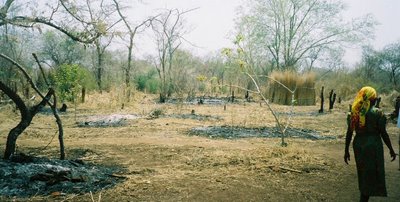 In the outlying villages, they don’t have even that level of sophistication. They have “long” latrines and “short” latrines. Off to the right here, the grass structure is the “short latrine” in one of the villages we visited.
In the outlying villages, they don’t have even that level of sophistication. They have “long” latrines and “short” latrines. Off to the right here, the grass structure is the “short latrine” in one of the villages we visited.First time I heard of this, I was completely perplexed. But they explained it to me. The “long” latrine is for doing “long business.” It is typically set off on the perimeter of the compound. And it typically offers a hole in the ground. The “short latrine” is for doing your “shorter” business. It’s generally closer to the compound.
In the villages where I visited the “short latrine,” it was simply a grass enclosure with hard-packed earth.
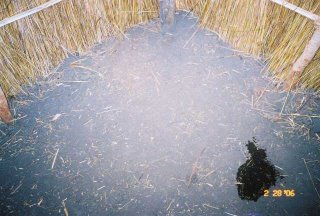 Be sure always to carry Kleenex in your pocket! and devise a system for stashing those Kleenex after you have used them. Because there’s not a wastebasket to be seen in Lui.
Be sure always to carry Kleenex in your pocket! and devise a system for stashing those Kleenex after you have used them. Because there’s not a wastebasket to be seen in Lui.Perhaps the funniest, biggest laugh our group had was this one night. After returning to the compound after a very long, hot, exhausting trip to a distant parish, one of our group went into the latrine one evening after dark. We all had grown fairly accustomed to seeing the 2” cockroaches at our feet, and perched on the walls to the left and right. But she got positioned in the stall, and then – all of a sudden! – both a large rat and a very large (ca. 12-16”) lizard went scrapping up the walls of the tiny latrine. She came barreling out of the latrine – calmly and hysterically saying, “No! No! No! Not gonna happen!! NO! NO! NO!!!” She came out vowing never again to enter the latrine after dark. The rest of us, upon hearing this, were reduced to tears of laughter and compassion. It really was a funny scene – as she herself understood. Though I’m not sure it translates well in this written forum.
Me? I had – until that evening – been working very hard to take in lots of water, in order to fend off jet-lag and dehydration and God-knows-what else. But at that moment, I began consciously and assiduously to cultivate dehydration. And I never regretted that decision. Deborah told us that the “Moru way” is to plan on using the latrine twice a day – once in the morning, and once in the evening. I felt much better when I was able to get into that rhythm.
Can we talk body odor? This happened to me on the first day that I went out to one of the archdeaconries on a visit. Remember, we’re piled into the back of a LandRover like sardines in a can. If it weren’t for the sweat that allowed us to “glide” easily against one another, we would all have blisters from the friction of bumping and rubbing against each other in that overcrowded truck. And the temperature in the truck is always over 100 degrees. So … on that first day out, my nose was assaulted by “body odor.” But – enlightened liberal that I am (or so I thought!) – I said to myself, “This is nothing to be offended about. It’s just how Africans smell.” Then we got to our destination, got out of the truck, and I was standing alone and lifted my arm and realized it was me! I laughed out loud, for no reason that anybody else could possibly understand. But I hope you can. It was an important lesson to me.




No comments:
Post a Comment